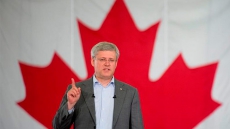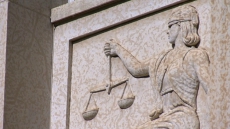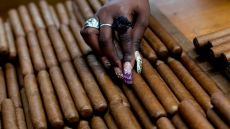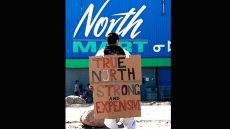CAIRO — Here is a look at the major events in the arrest and trial of three Al-Jazeera English journalists imprisoned in Egypt for over a year:
Dec. 29, 2013: Security forces storm into a five-star hotel suite in Cairo and arrest Canadian-Egyptian Mohammed Fahmy, Australian Peter Greste and Egyptian Baher Mohammed, all working for Al-Jazeera English. Authorities accuse the men of meeting there to "spread rumours harming national security." Mohammed Fawzy, a cameraman also arrested at the time, is released two days later. The journalists had been working at the hotel since the Egyptian government raided their offices.
Dec. 31, 2013: Egypt's top prosecutor orders the journalists held for 15 days on suspicion of joining a terrorist group, referring to the Muslim Brotherhood, and for spreading false news harmful to state security. The order was renewed on Jan. 9.
Jan. 13, 2014: More than 50 news organizations, including The Associated Press, call on Egyptian authorities to release the detained journalists. In a statement, the organizations say: "We strongly believe that upholding the rights of journalists and permitting the free flow of information is vital to bringing about greater understanding and serves the best interests of all Egyptians and the world."
Jan. 29, 2014: The prosecutor refers the case to trial.
Feb. 20, 2014: The trial opens, as the three journalists plead not guilty and shout from the dock that their prison conditions are "psychologically unbearable." Human Rights Watch decries the trial as "politicized."
March 18, 2014: In a rare gesture, Egypt's interim president writes to Greste's family, saying he would push to expedite the case.
April 10, 2014: Egyptian prosecutors present their first evidence to attempt to back up charges that three journalists and their co-defendants participated in terrorism, playing to the court an assortment of videos found in their possession. They include news clips about an animal hospital with donkeys and horses, and another about Christian life in Egypt. Defence lawyers — and even the judge — dismiss the videos as irrelevant, while defendants shouted from the dock that the trial was "a complete joke" and "an embarrassment to Egypt."
June 23, 2014: The court convicts the three journalists, sentencing Greste and Fahmy to seven years in prison and Mohammed to 10 years. The verdict brings a landslide of international condemnation and calls for newly elected President Abdel Fattah el-Sissi to intervene. U.S. Secretary of State John Kerry calls the verdict "chilling and draconian."
June 24, 2014: El-Sissi rejects calls from the United States and other Western governments that he pardon or commute the sentences of the three journalists.
July 6, 2014 - El-Sissi acknowledges for the first time that the heavy sentences had a "very negative" impact on his country's reputation, saying he wished they were never put on trial, in comments to editors of Egyptian media outlets.
July 23, 2014: The judge releases his reasoning for his sentence, saying the journalists were brought together "by the devil" to destabilize the country. The main evidence was footage produced by the journalists that included voices critical of the government.
Sept. 20, 2014: El-Sissi tells the AP: "If I had been in charge at the time, I never would have let the issue go so far. I would have deported them." But he says that if Egypt is to have an independent judiciary, "we can't accept criticism or comment" on court rulings.
Nov. 12, 2014: El-Sissi issues a new decree granting him the power to deport foreign defendants convicted or accused of crimes, a move that could allow him to free the imprisoned journalists. However, Mohammed's case remains more uncertain as he holds only Egyptian citizenship.
Nov. 20, 2014: El-Sissi says in an interview with France 24 that a presidential pardon is "being examined" for the three journalists.
Jan. 1: Egypt's Court of Cassation orders a retrial in the case after a hearing that lasts only minutes. The three journalists are not granted bail.





